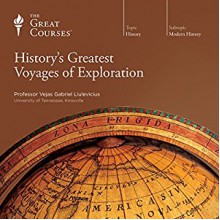Exploration is in our genes. Throughout history, one of the deepest human impulses has been the drive to explore, encounter, and know the unknown. This basic human longing can be traced all the way back to the most ancient origins of exploration over 60,000 years ago, when prehistoric wanderers...
show more
Exploration is in our genes. Throughout history, one of the deepest human impulses has been the drive to explore, encounter, and know the unknown. This basic human longing can be traced all the way back to the most ancient origins of exploration over 60,000 years ago, when prehistoric wanderers first settled the globe. Today’s high rates of global tourism and mass migrations reflect continuity with the restless habits of our ancestors.
From ancient wayfarers to modern astronauts, a steady succession of intrepid individuals can take the credit for binding the continents together, connecting previously isolated peoples, and sparking a cross-fertilization of ideas, technologies, and even foods.
In creating new trade routes and initiating a commerce of ideas, explorers have played perhaps the most active role in shaping the globalized world. The trails they blazed were fraught with danger, as they contended with disease, starvation, mutiny, perilous weather, and even cannibals.
In History’s Greatest Voyages of Exploration, you delve into the awe-inspiring, vast, and surprisingly interconnected tale of world exploration. Taught by Vejas Gabriel Liulevicius, an award-winning history professor at the University of Tennessee, Knoxville, these 24 lectures shine a spotlight on some of the greatest and most influential explorers the world has ever known—successful as well as unsuccessful, admirable as well as flawed. You’ll be spellbound as you witness the treacherous, at times fatal, expeditions into the unknown these adventurers embarked upon, whether to the frozen Poles, Asia, Europe, the Americas, Africa, the ocean’s depths, or the final frontier of space.
This course will revolutionize how you view the world by unveiling the process by which we came to know the far reaches of our planet. Throughout, you’ll examine the complex motivations behind these journeys, including religion, conquest, commerce, scientific discovery, and the overwhelming sense of wanderlust; and how voyages of discovery have inspired subsequent voyages—particularly when the preceding journey failed.
You’ll also discover the role that legends and myths have played in inspiring journeys, such as quests for places like the Northwest Passage; expeditions hunting for monsters and cannibals; and the pursuit of real or legendary individuals, such as Dr. Livingstone or Prester John, a mythical Christian king in Asia.
show less

